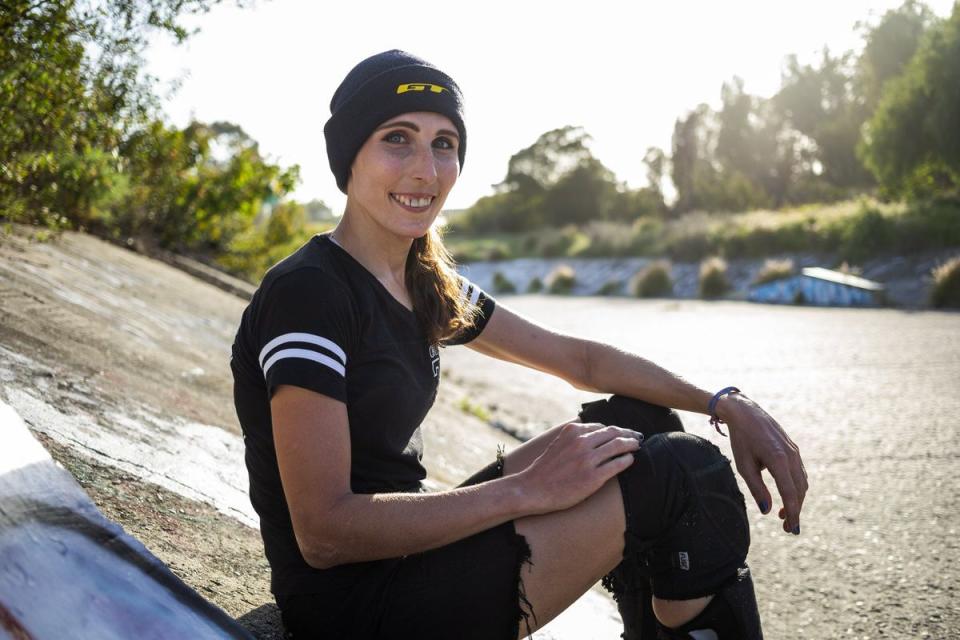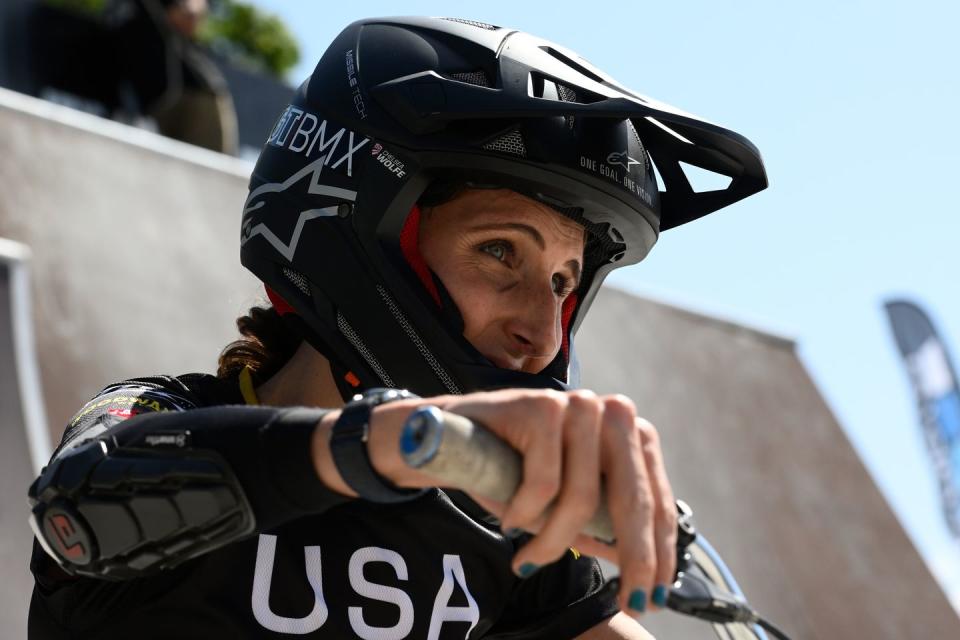Olympian Chelsea Wolfe Talks Candidly About the UCI’s Ban on Trans Women Athletes

- Oops!Something went wrong.Please try again later.
When she woke up on July 14, Chelsea Wolfe’s life was—in her own words—perfect. Her tickets were booked for Scotland, her registration for Freestyle BMX as part of Team USA was confirmed, her bags were partially packed, her training was going according to plan. She sat down to a bowl of cereal before heading to the bike park for a training session, and opened up Instagram. That’s where she learned that the UCI had just instituted a ban on trans athletes, starting in three days.
“My world crumbled in that moment,” she recalls, speaking to me on Zoom from her apartment in San Diego three weeks later—at the exact same time that the event she was supposed to compete in, Women’s Freestyle BMX, played out at Worlds. (American BMXer Hannah Roberts took her fifth title as we said goodbye.)
Wolfe is still sporting a Team USA t-shirt, and behind her, her walls are covered with Team USA and other BMX paraphernalia. Since Freestyle BMX became a UCI and then Olympic sport, it’s been her driving force, her life’s purpose. She was an alternate at the Tokyo Olympics—one of four transgender and nonbinary athletes to go to the Olympics ever—and had been counting the days until Super Worlds in Glasgow. Now, she doesn’t know what’s next.
No matter where you currently stand in the debate over the right of trans women to compete, here’s the thing: It’s tempting to try to keep the debate in the realm of the academic, the esoteric. But it’s not. It’s about humans. When you’re discussing with your friends whether or not trans women should be able to compete in sport, you’re not talking about an abstract concept. You’re talking about a 30-year-old woman who’s currently on suicide watch. There isn’t a big bad wolf out there; there’s a small-boned, frankly adorable Wolfe out there, and she just had her life turned upside down.
“It’s already been a rough life, and then they’re like, ‘Hey you know what’s a good idea? Let’s kick her while she’s down,’” Wolfe says with an ironic smile.
I ask how she’s doing, really.
“I think I’m doing about as well as anyone possibly could in this situation,” she says.
I smile.
“But that said, I have to have daily check ins with my therapist because I’m on suicide watch, for good reason,” she adds. “I’m scared of that. And I’m scared because I know that if I’m struggling in this way, almost everyone else who’s dealing with this probably is too.”
My smile fades.
Wolfe considers herself lucky that the US Olympic Committee has been supportive, helping her connect with a therapist—something she wouldn’t have been able to afford otherwise.

Before the UCI’s July 14 announcement that effectively banned trans women from competition starting July 17, Wolfe had been on top of the world. Not only was she part of Team USA, everything else was finally going her way. “I don’t know how to stress enough: My life was perfect. I am chasing my dreams. I am competing at the highest level possible. I’m riding the best I ever have. I’m feeling great. I’ve got a wonderful girlfriend. I get to ride bikes with friends. I live in paradise. Then, this shit dropped.”
She immediately knew that she needed to get back into therapy, stat. But—again, the word luck is a bit ironic here—luckily, she already had years of therapy behind her (“growing up as a trans, queer, autistic woman and abuse survivor in this society, I’ve had a lot of trauma”), and because of that, she had some tools to be able to start the process of dealing with the huge sense of loss she felt about her future, the future of trans women. She likens it to losing a loved one.
Vacillating between anger and sadness has become the norm for Wolfe. “Right now, I’m in a crisis and having urges to harm myself that feel uncontrollable. I am mourning the loss of this life that was just stolen from me,” she says. “But then I’m also thinking about how we need to fix this. The rage that I rightly feel having my life stolen from me is huge.”
That fight is what’s keeping Wolfe alive right now. And ironically, it’s a drive developed from the very sport that she’s no longer welcome in at the highest level. “It’s normal within BMX culture that if you crash, you get back up and you take a second run, or you try that trick again: Giving up is not something that we do,” she says. “I don't have the luxury of being able to be a pushover with being queer, being trans, being a woman, being autistic. I have to be able to stick up for myself to stay alive.”
Freestyle BMX quite literally saved her life as a young trans teen. Growing up in Florida, in the midst of surviving in an abusive home, Wolfe was using self harm in order to cope. Then, she got on the bike and everything changed. “BMX became this outlet where I suddenly could control what I did with my body and my life,” she says.

This isn’t the first fight to compete that Wolfe has been in: When Freestyle BMX was first brought in as a UCI sport in 2016, she went to one of the first World Cups to compete. There, she was told that without two years of the requisite blood testing entered into the UCI’s system, she wouldn’t be able to compete as a woman. Considering the fact that until that year, BMX wasn’t actually a UCI sport and Wolfe didn’t have a UCI license, it’s hard to see how she would have been able to submit any bloodwork to a governing body that didn’t govern her. That would be akin to sending a performance report weekly to a company you don’t actually work for and have no relationship with. (Wolfe recalls that many other rules—ahem, testing for banned substances like marijuana or minimum practice times for women—were not enforced.)
While Wolfe is working towards a legal resolution to the UCI’s ban—essentially, working on suing the UCI for the right to race—she recognizes that at 30 years old, even if she wins the case, it will likely be too late. The odds of a resolution before the 2024 Olympics are slim, and the average age of Freestyle BMX racers is getting younger and younger. It’s unlikely that if she does win, a return to racing at the level she’s at now will be possible. “They are stealing these years from me,” she says. “Regardless of whether or not we win in the long run, they are harming us now, and that harm can never be undone.”

Regardless of where you stand in the trans athlete debate, the mid-season abrupt shift in rules with a three day warning can only be considered cruel. It’s unprecedented: Even new rules about bike equipment aren’t enacted midseason, and rarely within an Olympic Games cycle. And certainly not two weeks ahead of a World Championship.
“I found out via a social media post,” Wolfe says. “Later that day, the UCI did email me. The email opened with ‘We hope this email finds you well.’ It did not.”
Only two weeks prior to the UCI’s announcement, Wolfe had spent the standard $500—out of pocket, even with good health insurance—on the requisite bloodwork required to show that her testosterone levels were within legal range for competition. They were accepted.
So, why enact the ban now? This new ban on trans athletes is a result of old research—research that had previously been used to allow trans athletes to compete if they met and maintained certain hormone levels. The reasoning provided in the release was that it was “impossible to rule out the possibility” of trans women having an unfair advantage.
“Initially, they claimed that their reason for even reviewing the rules was based on new scientific evidence that had been recently released. But then in their own announcement, they admit that this evidence does not exist, they admit that they have no reason to justify this discrimination,” Wolfe says.
If it feels like a political move, that’s because it’s almost impossible to reject the idea that it is one. “Every single review of the rules around trans women competing has come immediately after a trans woman reaching any modicum of success within competition. So in 2018, it was Dr. Veronica Ivy winning a Masters World Championship track race. This time, it was an athlete who won a lower level UCI event.”
What does this mean? It equates to the fact that trans women have been allowed to compete in the elite field for years—but not really. “We’ve never had the true right to compete, because there was always this unspoken notion that if you win, this privilege is going to be taken away from you. You’re not allowed to succeed, you’re just allowed to show up,” says Wolfe. “I believe the reason I haven’t faced the same amount of backlash as some of my other trans femme compatriots is because my strongest finish of all time is fifth. That doesn’t sell headlines. It’s hard to say that someone getting fifth place repeatedly is dominating the sport.”
If this reads like the moment of conflict in a bad Lifetime movie, that’s because it feels like one. “I’m hoping when this is all turned into a movie eventually, it’s actually a very moving passionate story about fighting against global fascism, and it’s nominated for an Oscar. But we’ll burn that bridge when we get to it,” Wolfe says, joking-but-not-really-joking.
The UCI did offer two concessions to trans athletes in their announcement. First, if you transition before male puberty, you can compete as a woman. But there’s a pretty big catch: Access to gender-affirming hormone therapy for minors, particular minors who are young enough to have not started puberty, is banned or severely restricted in most countries, the US included.
“I don’t think there’s anyone in the world who can meet that criteria right now,” Wolfe says. “Even in the most progressive countries, hormone blockers are not recommended until the age of 14—after puberty. The goalpost is currently unattainable.”
The other concession? If you race Masters, you can compete in the newly minted Men/Open category—which Wolfe says essentially ‘others’ trans women at minimum, and at worst, directly aligns them with cis-gendered men.
“I think the most sinister thing some people believe right now is that trans women have anything to do with cis men, that trans women aren’t women and have always been women,” Wolfe says. “The way that our brains and our bodies developed through our experiences of being trans women results in a very different person than a cis man.”
With the current—call it like it is—shitstorm that’s brewing, what is Wolfe doing right now?
“I have to figure out a way to survive,” she says. She means it in the most literal sense of the word, but also in the new fiscal reality she’s facing as a professional racer who’s been barred from racing professionally.
“My income is based entirely around competing in these events and qualifying for the US National Team. And that was snatched out from under me, without any notice,” she says. “I’ve just had the majority of my income yanked out from under me, in addition to no longer having access to the human right of sport.”
While there’s no way to avoid the grimness of her current reality, one thing is certain: She will keep riding. “When we hang up, I’m going out to ride,” she says. “I truly do love this shit. I live for this. It is the reason I am alive. It truly saved my life and I still have that same passion and joy. I’m not riding because I was able to compete all over the world. I was competing all over the world because I love it.”
Riding may be life-affirming, but competing is even more so. There’s a reason so many of us roll up to the start line of road, gravel and mountain bike races, whether we’re competing for first or 500th place. “Having competition gives you the ability to set goals for yourself and work to improve,” she says. “That’s why sport is a human right. It is the most human you can possibly feel, competing in a sport. They’ve taken the ability to do that away from one of the most vulnerable communities within our society.”

But so many don’t view trans women as vulnerable. Some see trans women as a threat—often a hypothetical one. “I can’t tell you the number of times I’ve had people say, ‘Oh, what if so and so top male pro athlete transitions and then starts competing?’ You don’t need to come up with these hypotheticals,” Wolfe says. “We know what the top trans woman BMX freestyle rider in the world looks and performs like. It is me. I am her.”
She is Chelsea Wolfe. She’s a thirty-year-old woman living in California, training to be just a little bit better every day. She rides with a big group of women in San Diego, she got her 89-year-old Nana out on the BMX bike, she drives a big Jeep into the mountains to spend time in nature, she takes ‘cutesy’ photos with her girlfriend, she binge-watches bad TV and scrolls on social media.
“Trans women are not just numbers on a spreadsheet or a mythological boogeyman,” she says. “We actually exist. We are human and we are vulnerable and we exist.”
If you are experiencing a mental health emergency, call or text 988 anytime for free, confidential support and resources.
You Might Also Like

